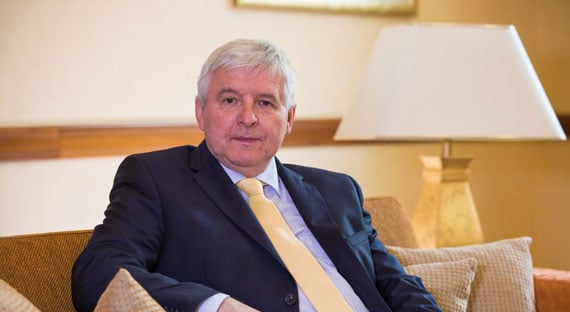
Jiří Rusnok, Governor of the Czech National Bank since 2016 (photo: Dean Tošovic)
Our previous interviews feature Octavian Armasu, Moldova’s Minister of Finance, Sergiu Cioclea, Governor of the National Bank of Moldova, Boštjan Jazbec, Governor of the Bank of Slovenia, Martina Dalić, Deputy Prime Minister and Minister of Economy of Croatia, Oleksandr Danyliuk, Minister of Finance of Ukraine, and Bedri Hamza, Governor of the Central Bank of Kosovo at the time of the interview.
Czech Republic: Economy So Far So Good
October 3, 2017
The Czech Republic is doing well: its growth at 2.4 percent is strong, unemployment at 3.3 percent is the lowest in the European Union, and its government debt is low. Yet the country must continue to improve the quality of its human capital and monitor mortgage loans if growth is to last. We sat down with Jiří Rusnok, Governor of the Czech National Bank to discuss recent developments.
In April, the central bank removed the upper limit of the euro exchange rate after three and a half years because inflation has started to move upwards. What is your experience after the shift?
For three years, we put a cap on the koruna-euro exchange rate as an unorthodox measure at a time of very low inflation, well below our target of two percent. But once we brought inflation back, close to or even slightly above the target, and assessed it to be sustainable, we decided to drop the cap. That was in the beginning of April. Of course, we prepared the market and public beforehand.
Afterwards, in what we saw as a very positive sign, there was no extraordinary volatility on the foreign exchange market involving the koruna. The Czech currency even started to appreciate slightly, and I'd say, unexpectedly. From our perspective, it was a positive move, signaling the beginning of a tighter monetary stance. So far, so good.
The Czech economy is exemplary in its low public debt, and unemployment is relatively low. Nevertheless, some economists say that the country should invest more in human capital.
True, the Czech economy is doing quite well. Growth this year could be close to, or even over three percent of GDP, which is probably slightly above the potential of about 2.5 percent. All the macroeconomic indicators are looking very positive. Of course, we would like to see more investment overall, but our investment cycle is very much linked to the seven-year budgetary cycle of the European Union and the arrival of the EU funds. And we must pay attention to investment in human capital.
Wages are growing vigorously, at about 5 to 6 percent each year. With inflation close to 2 percent, this translates into a significant growth for real wages for the last three years and we expect the trend to continue next year. Public or other investment in education is therefore also a relevant discussion in the Czech Republic.
Some Czech households take out big loans for mortgages now that their wages are growing. Is there a need for the banks to exercise caution?
First of all, I would like to stress that the indebtedness of Czech households is still far below the European standards. You are right that in recent years there has been a significant recovery—if not boom yet—in credit for households, mainly for mortgages. That is because of the very low interest rates and because of the fast-growing wages. It is a very convenient environment to buy apartments and houses.
At the same time, there are some supply constraints. The lack of available properties in the most attractive locations such as Prague, the capital, definitely pushes real estate prices up and therefore some caution is indeed necessary.
The central bank tries to make the public as well as other authorities aware of the potential risks of taking too much debt. We are using some measures in our policies such as countercyclical buffers for the banks and recommendations in the case of some households.
The Czech Republic is not yet part of the eurozone, where membership is a legal requirement for EU members once the adoption criteria are fulfilled. When does your country plan to join the euro area?
It is a topic of a continuous—sometimes hotter, other times cooler—political discussion. I do not see enough political braveness at this time. Over the next five to seven years, I imagine that we would not become a member of the eurozone.
You have been working with the IMF for decades. What has been your experience?
The role of the IMF was crucial during our transition to a market economy in the beginning of the 1990s. Later on, when we did not need financial support any more, we sought technical advice from the IMF.
The Fund’s technical expertise came in very handy with the financial stability assessment program (FSAP). We experienced quite a huge banking crisis in the late 1990s, beginning of 2000s, and when the Czech Republic became one of the countries piloting the IMF's FSAP, it taught us valuable lessons on how to establish up-to-date rules and supervision. Then, we were the first country to ever to publish the entire set of financial stability assessment documents.


